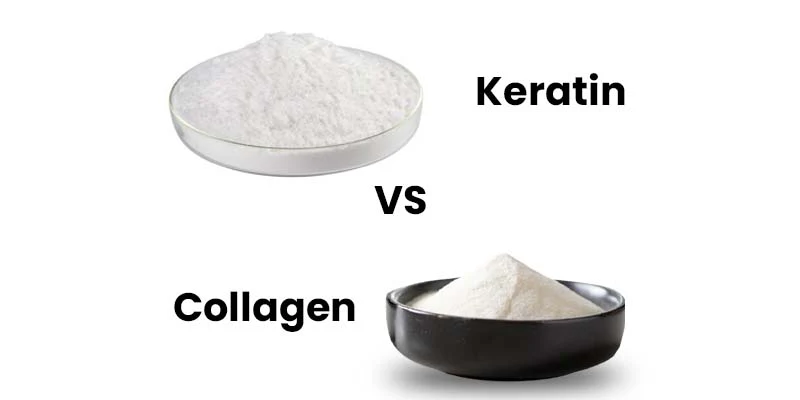When it comes to beauty and health supplements, two names that frequently pop up are collagen and keratin. Both are known for their remarkable benefits for hair, skin, and nails, but they serve different purposes and work in unique ways. Understanding the differences between collagen and keratin can help you make an informed choice about which one suits your needs best.
What is Collagen?
Collagen is the most abundant protein in the human body, making up about 30% of the body’s protein content. It serves as the main structural component of connective tissues, including skin, tendons, ligaments, and bones. Collagen provides strength and elasticity to the skin, helping to maintain its firmness and youthful appearance.
As we age, collagen production naturally decreases, leading to wrinkles, sagging skin, and joint discomfort. This is why collagen supplements have become popular, especially for anti-aging and joint health benefits. Collagen is typically available in hydrolyzed form, making it easier for the body to absorb and utilize.
What is Keratin?
Keratin is another vital protein, primarily found in hair, skin, and nails. It acts as a protective barrier against external damage, such as UV rays, pollution, and chemical exposure. Keratin is known for its strong and resilient nature, which is why it’s often associated with maintaining healthy and shiny hair.
Unlike collagen, keratin is not produced by the body but is derived from the foods we eat. It is also a popular ingredient in hair treatments, designed to smooth and strengthen hair strands. Keratin supplements and treatments are often used to repair damaged hair, reduce frizz, and enhance overall hair texture.
Key Differences Between Collagen and Keratin
While both collagen and keratin are proteins that contribute to beauty and health, they differ in structure, function, and benefits. Collagen is a structural protein found throughout the body, providing support and elasticity to the skin, joints, and bones. It promotes hydration, reduces wrinkles, and improves joint flexibility.
On the other hand, keratin is a fibrous protein that acts as a protective layer, primarily for hair, skin, and nails. It shields against damage and keeps hair strong and resilient. Keratin is known for enhancing hair shine and smoothness, making it a popular choice in hair care products and treatments.
Benefits of Collagen
Collagen offers a wide range of benefits for overall health and beauty. One of the most significant advantages is its ability to improve skin elasticity and hydration. By increasing collagen levels in the body, you can reduce the appearance of wrinkles and fine lines, achieving a more youthful and radiant complexion.
Collagen is also beneficial for joint health, as it helps maintain cartilage integrity and reduces joint pain. Additionally, collagen supports gut health by strengthening the gut lining, preventing issues like leaky gut syndrome. It also promotes muscle mass and bone health, making it an essential supplement for aging adults.
Benefits of Keratin
Keratin is highly regarded for its impact on hair health. It strengthens the hair shaft, reducing breakage and split ends. By smoothing the hair cuticle, keratin enhances shine and reduces frizz, giving your hair a polished and manageable look.
In addition to hair benefits, keratin also strengthens nails and improves skin texture. It provides a protective barrier against environmental damage, maintaining skin resilience and elasticity. Keratin treatments are particularly popular for those with damaged, frizzy, or color-treated hair, as they restore vitality and shine.
Collagen vs Keratin: Which is Better for Hair?
When it comes to hair health, both collagen and keratin play essential roles but in different ways. Keratin directly impacts the hair structure, making it smoother, shinier, and more resistant to damage. This is why keratin treatments are commonly used for hair straightening and frizz control.
Collagen, on the other hand, works from within by supporting the hair follicles and improving scalp health. It promotes hair growth and reduces hair thinning by maintaining the structural integrity of hair roots. If you’re looking for overall hair growth and strength, collagen supplements are an excellent choice. For immediate shine, smoothness, and frizz control, keratin treatments are more suitable.
Collagen vs Keratin: Which is Better for Skin?
Collagen is the go-to protein for skin health due to its anti-aging properties. It improves skin elasticity, reduces wrinkles, and enhances hydration, giving the skin a youthful and plump appearance. Collagen also supports wound healing and minimizes the appearance of scars.
Keratin, while less impactful on anti-aging, provides a protective barrier for the skin. It enhances skin strength and resilience, making it more resistant to environmental damage. Keratin is especially beneficial for those with sensitive or damaged skin, as it maintains the skin’s protective barrier.
Can You Take Collagen and Keratin Together?
Yes, you can take collagen and keratin together as they complement each other’s benefits. While collagen works from within to support skin elasticity, joint health, and hair growth, keratin provides an external shield, enhancing hair shine and protecting against damage.
Combining both proteins can give you a holistic approach to beauty and health, ensuring strong hair, youthful skin, and robust nails. However, it’s essential to follow the recommended dosage and consult with a healthcare provider if you have any underlying health conditions or allergies.
How to Choose the Right Supplement
When choosing between collagen and keratin supplements, consider your specific needs and goals. If you’re looking to improve skin elasticity, reduce wrinkles, or enhance joint health, collagen is the better option. For shiny, smooth, and resilient hair, keratin supplements or treatments are more suitable.
It’s also essential to choose high-quality supplements from reputable brands. Look for collagen derived from grass-fed or wild-caught sources for maximum purity. For keratin, choose products that are free from harsh chemicals and formaldehyde, especially if opting for hair treatments.
Potential Side Effects and Precautions
Both collagen and keratin are generally safe for most people, but some may experience mild side effects. Collagen supplements can cause digestive discomfort, such as bloating or heartburn, in some individuals. It’s advisable to start with a lower dose and gradually increase it.
Keratin treatments, especially those containing formaldehyde, may cause scalp irritation, allergic reactions, or respiratory issues. It’s crucial to choose formaldehyde-free products and conduct a patch test before using any keratin-based treatment.
Final Thoughts: Which One Should You Choose?
Choosing between collagen and keratin depends on your specific beauty and health goals. If you’re looking to improve skin elasticity, reduce wrinkles, and support joint health, collagen is the best choice. For shiny, smooth, and strong hair, keratin is more effective.
Ultimately, both proteins offer unique benefits and can be used together for a comprehensive approach to beauty and wellness. By understanding their differences and functions, you can make an informed decision and achieve your desired results.
Whether you’re looking to maintain youthful skin, grow stronger hair, or enhance overall health, incorporating collagen and keratin into your daily routine can provide remarkable benefits. With the right supplement choice, you can achieve radiant beauty from the inside out.








